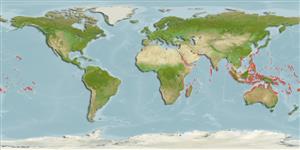分类 / Names
俗名 | 同种异名 | Catalog of Fishes(属, 种) | ITIS | CoL | WoRMS | Cloffa
Teleostei >
Blenniiformes (Blennies)
鱸形目 (Blennies) >
Blenniidae (Combtooth blennies) > Salariinae
Etymology: Blenniella: Diminutive of blennius, Greek,blenios = mucus (Ref. 45335).
More on author: Valenciennes.
Issue
Genus Williams, pers. comm.
Environment: milieu / climate zone / depth range / distribution range
生态学
海洋 礁区鱼类; 深度上下限 0 - 3 m (Ref. 30874). 熱帶; 30°N - 30°S
Indo-Pacific: Red Sea south to Durban, South Africa, east to the Marquesas and Tuamoto Islands, north to the Ryukyu Islands; throughout Micronesia.
印度-太平洋: 紅海南至南非的德爾班,東至馬可薩斯島與 Tuamoto 島, 北至琉球群島; 在密克羅尼西亞各處。
大小 / 重量 / 年龄
Maturity: Lm ? range ? - ? cm
Max length : 15.0 cm SL 雄鱼/尚未辨别雌雄; (Ref. 9710)
背棘 (总数) : 12 - 14; 背的软条 (总数) : 18 - 21; 臀棘: 2; 臀鳍软条: 19 - 21; 脊椎骨: 25 - 27. Diagnosis: Dorsal fin XIII, 18-21, notched between spinous and segmented-ray portions; anal fin II, 19-21; pectoral rays 13-15 (usually 14); pelvic fin I, 3; caudal fin, procurrent rays 7, segmented rays 13. Vertebrae 12 + 25-27. Orbital cirrus simple and slender, may have a short lateral branch, less often up to 4 branches; nasal cirri short and palmate, may rarely have more than 6 branches; nuchal cirri simple and slender, may have a single branch or a ragged edge. Mandibular pores 6. Dorsal lips margin entire, ventral margin crenulated. Occipital crest absent, but large males have a low thin ridge (less than 1.8 mm); no crest or ridge in females Three color-pattern types described for different localities (see Ref. 9962). Body of males with 6-7 dusky bands with 1 or a pair of dark margined, pale, oblong spots on each band; dark spots on spinous dorsal, dusky lines on rayed dorsal. Females with spots on caudal peduncle; body sometimes with fine dark specks (Ref. 4404). Body depth at anal-fin origin 4.6-5.3 in SL (Ref. 90102).
三彩色斑纹类型为不同的地点描述。 (见参考文献 9962) 雄性的身体有 6-7 暗色的条纹有一个或一对深色的边缘是, 在每条条纹上的灰白又长方形斑点; 在有鳍条的背鳍上的在刺状的背部又暗色的联机的深色的斑点。 雌鱼有斑点在尾梗上; 身体有时有深色细的斑点。 (参考文献 4404)
Adults inhabit exposed outer intertidal reef flats, where it can hide in cracks and holes. Commonly observed clinging to rocks as the water recedes below them during the low cycle of the swell and this species is often confused with mudskipper gobies (Ref. 48636). They feed on filamentous algae and associated small invertebrates, such as foraminiferans, ostracods, copepods, and gastropods. Oviparous. Eggs are demersal and adhesive (Ref. 205), and are attached to the substrate via a filamentous, adhesive pad or pedestal (Ref. 94114). Larvae are planktonic, often found in shallow, coastal waters (Ref. 94114). Rarely used for aquarium fish.
栖息于裸露的潮间带外围礁石平台, 在那里它能藏在裂缝与洞中。 通常观察附着于岩石当海水消退低于他们海浪周期低点期间与这种时常与弹涂鱼互相混淆.(参考文献 48636) 吃丝状藻类与伴随的小型无脊椎动物例如有孔虫,介形虫,桡脚类的动物与腹足动物。 卵生的.(参考文献 205) 卵是底栖与聚集在一起的。 (参考文献 205) 很少用来了水族馆鱼。
Life cycle and mating behavior
Maturities | 繁殖 | Spawnings | Egg(s) | Fecundities | 仔鱼
Distinct pairing (Ref. 205).印度-太平洋: 紅海南至南非的德爾班,東至馬可薩斯島與 Tuamoto 島, 北至琉球群島; 在密克羅尼西亞各處。
Springer, V.G. and J.T. Williams, 1994. The Indo-West Pacific blenniid fish genus Istiblennius reappraised: a revision of Istiblennius, Blenniella, and Paralticus, new genus. Smithson. Contrib. Zool. 565:1-193. (Ref. 9962)
人类利用
渔业: 没有兴趣
工具
特别资料
下载 XML
网络资源
Estimates based on models
Preferred temperature (Ref.
123201): 25 - 29.3, mean 28.4 °C (based on 2554 cells).
Phylogenetic diversity index (Ref.
82804): PD
50 = 0.5020 [Uniqueness, from 0.5 = low to 2.0 = high].
Bayesian length-weight: a=0.00741 (0.00335 - 0.01640), b=3.02 (2.83 - 3.21), in cm total length, based on LWR estimates for this (Sub)family-body shape (Ref.
93245).
营养阶层 (Ref.
69278): 3.3 ±0.43 se; based on food items.
回复力 (Ref.
120179): 中等的, 族群倍增时间最少 1.4 - 4.4年 (Preliminary K or Fecundity.).
Fishing Vulnerability (Ref.
59153): Low vulnerability (10 of 100).
Nutrients (Ref.
124155): Calcium = 115 [56, 183] mg/100g; Iron = 0.664 [0.377, 1.120] mg/100g; Protein = 18.5 [17.3, 19.6] %; Omega3 = 0.0767 [, ] g/100g; Selenium = 16.1 [7.5, 34.7] μg/100g; VitaminA = 144 [44, 446] μg/100g; Zinc = 1.83 [1.21, 2.64] mg/100g (wet weight);
